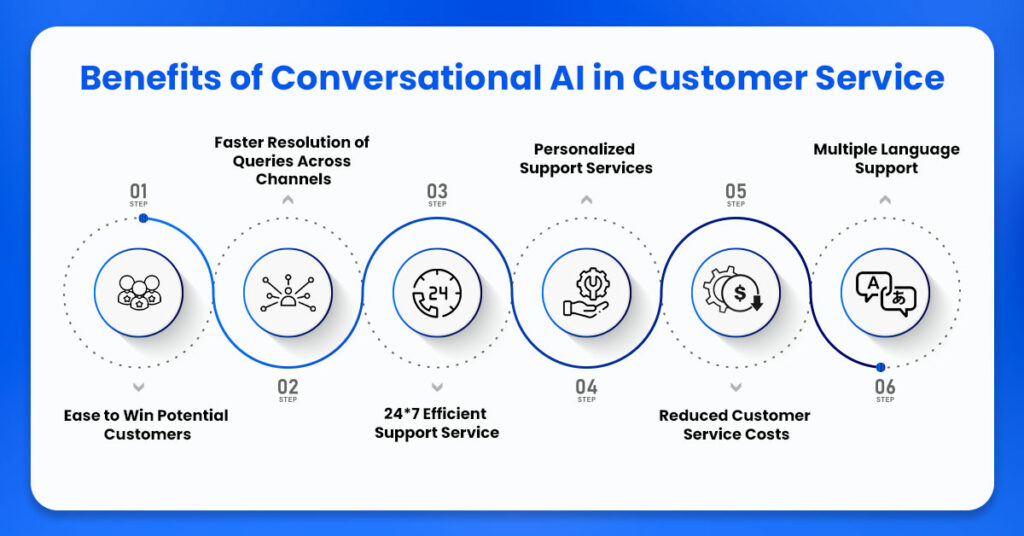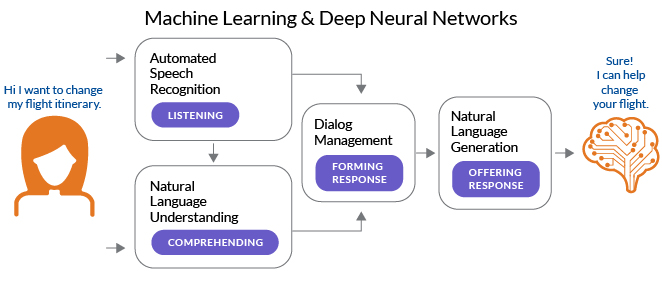In today’s rapidly evolving digital landscape, businesses are increasingly turning to conversational AI to revolutionize the way they interact with customers. This technology, which encompasses chatbots, virtual assistants, and other AI-driven communication tools, has proven to be a game-changer in enhancing customer service, personalizing interactions, and improving overall customer satisfaction. As customer expectations continue to rise, companies that effectively leverage conversational AI are better positioned to meet these demands, leading to stronger customer relationships and a competitive edge in the market.
1. The Rise of Conversational AI in Customer Service
Customer service has always been a cornerstone of successful business operations. With the advent of conversational AI, companies can now offer more efficient, responsive, and personalized service to their customers. AI-driven chatbots and virtual assistants are capable of handling a wide range of customer inquiries, from simple questions to complex problem-solving, all in real-time.
One of the most significant benefits of conversational AI in customer service is its ability to provide 24/7 support. Unlike human agents, AI-powered systems do not require breaks or downtime, allowing businesses to offer around-the-clock assistance. This is particularly valuable in today’s global economy, where customers may need support at any hour of the day. By providing immediate responses to customer inquiries, businesses can reduce wait times and enhance the overall customer experience.
Additionally, conversational AI can handle multiple customer interactions simultaneously, significantly increasing efficiency. This scalability is especially beneficial during peak times, such as holiday seasons or major product launches, when customer inquiries can skyrocket. By deploying AI-driven chatbots, businesses can manage high volumes of requests without compromising on service quality.

2. Personalizing Customer Interactions
Personalization has become a key differentiator in customer experience, and conversational AI is at the forefront of this trend. By leveraging data and machine learning algorithms, AI-powered systems can analyze customer behavior, preferences, and past interactions to tailor responses and recommendations to individual needs.
For instance, a customer interacting with an AI-driven virtual assistant might receive personalized product recommendations based on their previous purchases or browsing history. This level of customization not only enhances the customer experience but also increases the likelihood of conversion. Customers are more likely to engage with and purchase products that are relevant to their interests and needs.
Moreover, conversational AI can help businesses create more meaningful and lasting connections with their customers. By remembering previous interactions and preferences, AI systems can engage customers in a more human-like manner, fostering a sense of familiarity and trust. This personalized approach can lead to higher customer satisfaction and loyalty, as customers feel valued and understood by the brand.
3. Enhancing Overall Customer Satisfaction
The ultimate goal of any customer service strategy is to achieve high levels of customer satisfaction, and conversational AI plays a crucial role in this regard. By providing quick, accurate, and personalized responses to customer inquiries, AI-driven systems can significantly improve the overall customer experience.
One way conversational AI enhances customer satisfaction is by reducing the need for customers to repeat themselves. Traditional customer service channels often require customers to provide the same information multiple times, leading to frustration and dissatisfaction. However, AI-powered systems can retain customer information throughout the interaction, ensuring a seamless and efficient experience.
Furthermore, conversational AI can proactively address customer needs by anticipating potential issues and offering solutions before they arise. For example, if a customer’s flight is delayed, an AI-driven chatbot could automatically notify them of the delay and provide alternative travel options. This proactive approach not only resolves issues quickly but also demonstrates a commitment to customer care, leading to higher satisfaction levels.
4. Leveraging Conversational AI for Customer Feedback
Another significant advantage of conversational AI is its ability to gather and analyze customer feedback in real-time. By integrating AI-driven tools into customer service channels, businesses can collect valuable insights into customer preferences, pain points, and overall satisfaction.
For example, a chatbot might ask customers for feedback at the end of an interaction, allowing the business to gauge the effectiveness of the service provided. This feedback can then be analyzed using AI algorithms to identify trends and areas for improvement. By continuously monitoring and analyzing customer feedback, businesses can make data-driven decisions to enhance their customer service strategies and improve overall satisfaction.
Additionally, conversational AI can help businesses track customer sentiment over time. By analyzing the tone and language used in customer interactions, AI systems can identify shifts in customer sentiment, allowing businesses to address potential issues before they escalate. This proactive approach to customer sentiment analysis can lead to more positive customer experiences and stronger brand loyalty.

5. Integrating Conversational AI with Omnichannel Strategies
In today’s interconnected world, customers expect seamless experiences across multiple channels, whether they are interacting with a brand via social media, email, or in-store. Conversational AI plays a crucial role in enabling omnichannel customer service strategies by providing consistent and personalized interactions across all touchpoints.
For instance, a customer might begin an inquiry on a company’s website chatbot and later continue the conversation via a messaging app or email. Conversational AI ensures that all customer information and context are carried over between channels, creating a unified and cohesive experience. This integration not only improves customer satisfaction but also streamlines the customer service process, reducing the risk of errors or miscommunication.
By incorporating conversational AI into their omnichannel strategies, businesses can deliver a more consistent and personalized customer experience, regardless of the channel or device being used. This level of integration is essential in today’s competitive market, where customers expect seamless and frictionless interactions with brands.

6. Case Studies: Success Stories of Conversational AI in Action
To fully appreciate the impact of conversational AI on customer experience, it is helpful to examine real-world examples of businesses that have successfully implemented this technology.
Case Study 1: Sephora’s Virtual Assistant
Sephora, a leading beauty retailer, has successfully leveraged conversational AI to enhance its customer experience. The company’s virtual assistant, Sephora Virtual Artist, allows customers to try on makeup virtually, receive personalized product recommendations, and book in-store appointments. This AI-driven tool not only provides a unique and interactive shopping experience but also drives higher engagement and sales. Customers appreciate the convenience and personalization offered by Sephora’s virtual assistant, leading to increased customer satisfaction and loyalty.

Case Study 2: H&M’s AI Chatbot
H&M, a global fashion retailer, has implemented an AI-powered chatbot on its website and mobile app to assist customers with product recommendations and sizing advice. The chatbot uses machine learning algorithms to analyze customer preferences and provide tailored suggestions based on their style and previous purchases. By offering personalized assistance, H&M’s chatbot enhances the online shopping experience, making it easier for customers to find the right products. This has resulted in higher conversion rates and improved customer satisfaction.

Case Study 3: Bank of America’s Erica
Bank of America’s virtual assistant, Erica, is another excellent example of how conversational AI can improve customer experience. Erica provides customers with a wide range of banking services, including balance inquiries, bill payments, and transaction history. The AI-driven assistant also offers financial advice and alerts customers to potential issues, such as low account balances or unusual transactions. By providing quick and personalized assistance, Erica has become a valuable tool for Bank of America’s customers, leading to higher satisfaction and engagement.

7. The Future of Conversational AI in Customer Experience
As conversational AI continues to evolve, its impact on customer experience is expected to grow even further. Advances in natural language processing (NLP), machine learning, and AI-driven analytics will enable even more sophisticated and personalized interactions between businesses and customers.
In the future, we can expect to see conversational AI systems that are capable of understanding and responding to complex emotions, providing even more human-like interactions. Additionally, the integration of AI with emerging technologies such as augmented reality (AR) and virtual reality (VR) will create new opportunities for immersive and engaging customer experiences.
Moreover, as businesses continue to collect and analyze customer data, conversational AI will play a critical role in enabling hyper-personalization, where interactions are tailored to the individual’s unique preferences and needs. This level of personalization will not only enhance customer satisfaction but also drive brand loyalty and long-term customer relationships.
8. Conclusion
Conversational AI has undeniably transformed the way businesses interact with their customers, offering unprecedented levels of efficiency, personalization, and satisfaction. As this technology continues to advance, its role in shaping the future of customer experience will only become more significant. Businesses that embrace conversational AI and integrate it into their customer service strategies will be well-positioned to meet the evolving demands of their customers, ultimately leading to stronger relationships, higher satisfaction, and sustained success in the competitive marketplace.
9. About SmartDev AI Service Offerings
SmartDev is at the forefront of leveraging conversational AI to transform customer experiences across various industries. Our AI service offerings are designed to help businesses implement cutting-edge AI-driven solutions that enhance customer service, boost engagement, and drive personalization. We specialize in developing custom AI chatbots, virtual assistants, and automated customer support systems that integrate seamlessly with existing platforms and processes. By combining advanced natural language processing (NLP) capabilities with machine learning, SmartDev ensures that our AI solutions are not only intelligent but also adaptable to the unique needs of each business. Our commitment to innovation and excellence in AI development allows our clients to stay ahead of the competition, offering their customers a truly differentiated and superior experience.
At SmartDev, we are passionate about helping businesses unlock the full potential of conversational AI to elevate their customer experience. Whether you’re looking to implement AI chatbots, virtual assistants, or other AI-driven customer service solutions, our team of experts is here to guide you every step of the way. Discover how our innovative AI services can transform your business and provide your customers with the personalized, efficient, and engaging experiences they expect. To learn more about our AI offerings and how we can help you stay ahead in today’s competitive landscape, visit our website or contact us directly for a consultation.






